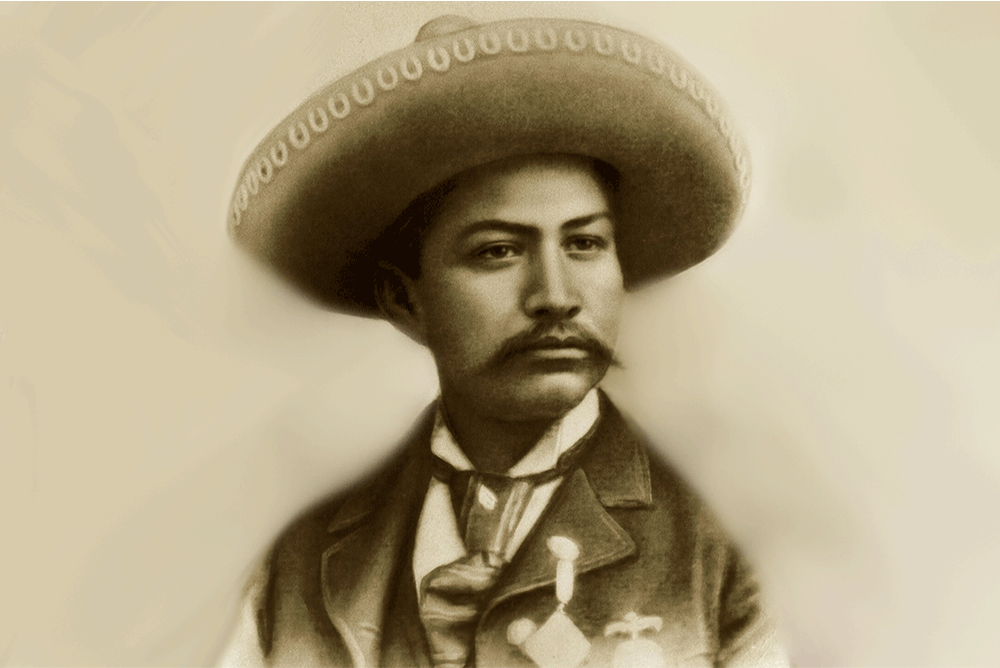
Juventino Rosas (above) wrote one of the most famous melodies of his generation. Playwright Oliver Mayer considers the forces that have prevented the composer from taking his rightful place among history’s great composters. Courtesy of author.
Juventino Rosas’ waltz “Sobre las Olas” (Over the Waves) is perhaps the most famous song of its generation. Now, more than 130 years after it was written, the tune still feels immediate—sweeping, dreamy, and above all, supremely sure-footed. Every note is both rooted and soaring, coaxing even the wallflowers to dance and sway. It is easily on par with his contemporary Johann Strauss Jr.’s masterwork “The Blue Danube”—to the point that Strauss Jr. is often mistakenly credited with having composed “Sobre las Olas.”
Why is this so? Is it simply because Strauss hailed from Vienna, the very center of the waltz craze? Or is there something else, conscious or not, that has kept Juventino Rosas from his rightful place among the great melodists, then and now?
I wrote Ghost Waltz, a new play receiving its world premiere on May 4 at the Los Angeles Theatre Centre (LATC), to recover the composer’s story. This excavation into Rosas’ life follows a tune that has been haunting me throughout much of my career: Why whitewash so many artists of color? Why bury their names? Why divest the art from the artist? Why erase the rich history of who we are?
Rosas was Indigenous, dark-skinned in his photographs, and young. Proudly Otomí, an ancient people known to be great warriors, he and his family played music for coins on the street in Mexico City in the 1880s. It was a time of great change: The French and Austrian attempt at colonization had failed in spectacular fashion, but vestiges of European culture were everywhere. Beer and polkas became core to the Mexican identity. Rosas embodied this moment in time. Yet, even as his famous waltz took the world by storm, he found himself having to prove his authorship. Losing the battle for the song’s royalties was just one indignity of many to come. In his own epoch as much as ours, Juventino did not fit the frame of the composer of “Sobre las Olas.” How could someone like him have written something so elegant, so graceful, so very Viennese?
There is precious little historical information to be found on the man himself. Part of a musical family, he was a violin prodigy who studied for a short time in conservatory before joining the world-famous Mexican Marching Band. Besides his famous waltz, he composed popular salon music, seductive polkas, and mazurkas for the piano. The wife of Mexican president/dictator Porfirio Diaz gifted him a grand piano for his genius, and his music was played throughout the Americas and in Europe, then and now.
For perhaps the same reasons he had to prove himself constantly to a disbelieving world, Rosas did not merit a biography in his day. His was also a generation before recorded music, and photographs were a relatively new technology. For Ghost Waltz, all I had were the compositions and how they made me feel.
Sometimes a play can get closer to the heart of a character than data or documentary. Listening to “Sobre las Olas” and other Rosas compositions over and over, I began to see past the darkness and locate gestures and contours of the 1890s—bits of politics, romantic dalliances, and the youthful desire to create something immortal, timeless. In an epoch rampant with economic inequity, crippling labor strikes and violent assassinations, not to mention enforced colorism and racial discrimination, this is music full of hope and joy, even when tinged with heartache and loss.
I was also able to locate Rosas in others. He was the same age as Scott Joplin, the undisputed “King of Ragtime,” a Black man whose musical oeuvre was similarly buried or forgotten alongside his life story until the 1973 movie The Sting used his song “The Entertainer,” and an expectant generation of music lovers recovered his ocean of rags and waltzes (one of which quotes a Rosas melody). How wonderful it was to discover that both Rosas and Joplin were both in Chicago in 1893 for the World’s Fair! Two young men of color, musical virtuosi, at the beginning of their heroes’ journeys, undaunted by the odds against them, with visions of as-yet-unwritten operas and symphonies dancing in their heads.
An opera singer originally from Mazatlan named Ángela Peralta, another of Rosas’ musical colleagues (and a possible love interest), also helped open up his story. Known to the world by her nickname the “Mexican Nightingale,” she was brown-skinned and Indigenous like Rosas. Unlike Rosas, she hid her dark complexion beneath white face powder.
In many ways, Peralta was the opposite of Rosas: elitist, self-conscious, Eurocentric. A soprano, she played La Scala and other European opera houses, as well as toured the Americas—always under the mask of whiteness. Yet, despite her different philosophy of dealing with casteism and racism, the “Nightingale” ultimately endured the same fate as Rosas: Their names and exploits buried, at home and abroad, their brownness whitewashed, erased.
After many decades of writing plays, I’ve concluded that there is no good reason to write about the past unless you’re trying to work out the problems we confront in our own everyday present. When I go back into history, my main thrust is to open the mystery in a historical moment, and by mystery, I mean what is unknown—as of yet. This history/mystery rhyme is vital to my artistic intentions, and the way I set about building the world of the play. There can hardly be one without the other.

The new play “Ghost Waltz” tells the story of Juventino Rosas, one of Mexico’s most significant composers. Image courtesy of author.
As it happens, this play began in dream form. I knew nothing about Rosas until the Latino Theater Company presented his story as one potential commission idea for the Circle of Imaginistas writing circle. Here was an Indigenous forebear, someone who might have influenced and inspired generations of native-born Americans on either side of the border, but whose story was silenced, lost. The presentation made an impression on me, but I was hot about another project, so Rosas found himself on my back burner.
Then I had a dream: Rosas in huaraches and white cotton, dancing to the waltz in his head, while the world circa 1890 was crashing all around him. Despite the tumult, he danced with calm and purpose, as if following the tune toward an as-yet unrevealed destiny. When I woke up, I went to my laptop and wrote a page or so, trying to catch not only the images but the dream’s feeling.
Many years ago, I wrote the libretto for an opera called America Tropical about the great 1932 mural by David Alfaro Siqueiros on Olvera Street in Los Angeles that was literally whitewashed by the all-white city council and town fathers for its political content. Not only was the image taken forever from us, but the artist was deported, never to return. The center figure of the mural? A 14-foot-tall Indio crucified on a double cross, facing City Hall, foretelling the fate of his violent erasure, the double injustice of past and present bigotry.
Today, the “America Tropical” mural lives in a liminal state. Years of California sun beating down on the whitewashed wall have thinned the cover-up, destroying the mask, allowing Siqueiros’ original images to ghost through. Between two worlds, living on the fringes, the mural’s story now is both the original punch of provocation and the counterpunch of effacement, deletion from history. Thesis and antithesis leave us forever on the borders unless we can find a way to synthesize the experience, see beyond the false front, and reconcile the mysteries of our relation to both the artist and the silencer of art.
As a playwright, my job is to shine a light on these layers of whitewash hiding the lives of Rosas and so many others like him. The damage cannot be undone, but there is a chance at recovery and a story to tell in the ghosting through of our history, and our mystery.
Not everyone has forgotten Rosas. There is a town named for him, along with a statue, in the central east region of the state of Guanajuato where he was born and where the Otomí continue to thrive. One day I’ll pay my respects. But I write to bring the dead to life.
Juventino Rosas deserves to be heard and seen. Because when we see him, we see ourselves. When we hear his music, he lives again.




Send A Letter To the Editors